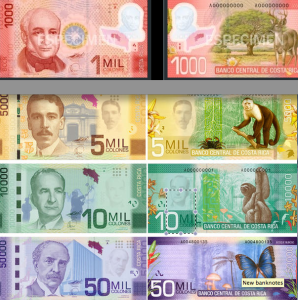Dollars? Rupees? Yuan? Baht? Riyals? Euros? Pounds? What is your local currency called and what is it worth?
The local currency in Costa Rica is called “colones“, however the U.S. dollar is widely accepted.
For a current exchange rate, visit xe.com.
XE Currency Converter
| 1.00 USD | = | 530.380 CRC |
| US Dollar | ↔ | Costa Rican Colon |
| 1 USD = 530.380 CRC | 1 CRC = 0.00188544 USD |
Accessing your money abroad:
We recommend using your banking card (ATM/debit) attached to your U.S. bank account. Using ATM cards enables you to access your own personal bank account from any ATM machine around the world. The primary advantages of getting money from an ATM are 24-hour access and preferential exchange rates.
ATMs
The Visa Plus network is the standard, but machines on the Cirrus network, which accepts most foreign ATM cards, can be found in larger cities and tourist towns. In these areas, ATMs also dispense U.S. dollars, which is convenient for payments at top-end hotels and tour agencies. Note that some machines will only accept cards held by their own customers.
Cash & Currency
The Costa Rican currency is the colón (plural colones, ₡), named after Cristóbal Colón (Christopher Columbus). Bills come in 1000, 2000, 5000, 10,000, 25,000 and 50,000 notes, while coins come in denominations of 5, 10, 20, 25, 50, and 100. Note that older coins are larger and silver, while newer ones are smaller and gold-colored – this is often a source of confusion for travelers fresh off the plane.

Throughout Costa Rica, you can pay for tours, park fees, hotel rooms, midrange to expensive meals and large-ticket items with U.S. dollars. However, local meals, bus fares, and small items should generally be paid with colones.
Paying for things in U.S. dollars should be free of hassle, and at times is encouraged since the currency is viewed as being more stable than colones.
Credit Cards
You can expect a transaction fee on all international credit-card purchases. Holders of credit and debit cards can buy colones and sometimes U.S. dollars in some banks, though you can expect to pay a high transaction fee. Cards are widely accepted at some midrange and most top-end hotels, as well as top-end restaurants and some travel agencies. All car rental agencies accept credit cards.
Exchanging Money
All banks will exchange U.S. dollars, and some will exchange euros and British pounds; other currencies are more difficult. Most banks are very busy, i.e. the state-run institutions (Banco Nacional, Banco de Costa Rica, Banco Popular), though they don’t charge commissions on cash exchanges. Private banks (Banex, Banco Interfin, Scotiabank) tend to be faster. Make sure the dollar bills you want to exchange are in good condition or they may be refused.
Taxes
Travelers will notice a 13.39% sales tax at midrange and top-end hotels and restaurants, while hotels also charge an additional 3% tourist surcharge. Everybody must pay a US $26 airport tax upon leaving the country. It is payable in US dollars or in colones, and credit cards are accepted. Note that some travellers have reported that this fee was charged on their cards as a cash advance, which resulted in a hefty fee.
For more information on taxes check out Lonely Planet.
IMPORTANT INFORMATION ABOUT USING YOUR DEBIT CARD ABROAD:
Check with your bank to make sure you can use your card overseas, and to inform them that you will be living abroad. Give them your dates, and all the countries you anticipate traveling to. It is not uncommon to be cut off from your bank account after using your card abroad, even after giving them forewarning. If this happens, don’t panic! Banks do this to protect their clients, and we should be grateful. If this happens to you, you just need to contact your bank to ensure them that you are in possession of your card and that you need to have access to your account while you are abroad. If you have a shared account with a family member and their name is also on the account, sometimes it’s helpful to get word to them to call the bank for you, considering the potential time difference between Costa Rica and home.
#CISabroadtraveltip: Call your bank a few weeks before you leave to notify them of your travel dates and countries visited AND call again a day or two before your departure to confirm they have your travel plans recorded.
In order to withdraw cash from an ATM using a debit or credit card, you must have a 4-digit pin. While you’re most likely very familiar with your debit PIN, you might not know a PIN for your credit card. Be sure to ask before you travel, banks will not release this information over the phone, via text, through an email or in any other way than to mail your PIN to the mailing address associated with your account.
.
Many ATMs in Latin America only accept debit/credit cards that have the Cirrus, Plus, Visa, MasterCard, or American Express symbol on the back of the card. It is a good idea to have both options available – an ATM card and a credit card – just in case of an emergency. When you use your bank card, the ATM machine will automatically convert the money into the local currency for you. Please ask your bank about their fees associated with international transactions, they may charge you anywhere from $5.00 to $7.00 per transaction, and that adds up!


